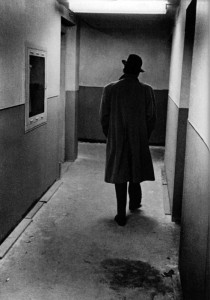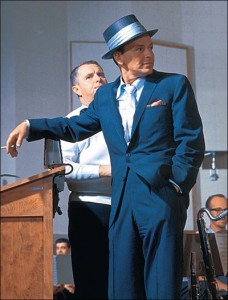 I watched both parts of Sinatra: All or Nothing at All, Alex Gibney’s four-hour-long documentary about the life and art of Frank Sinatra, last night. Entirely aside from the fact that I figured prominently in it, I thought it extraordinarily good, perhaps the best TV documentary about a musician made to date. To be sure, Gibney mostly showed us Sinatra from the singer’s own point of view and that of his family members—in particular his son, who has long fascinated me, and his first wife, who describes their failed marriage with arresting candor—but given that fact, All or Nothing at All still struck me as unusually balanced and forthright.
I watched both parts of Sinatra: All or Nothing at All, Alex Gibney’s four-hour-long documentary about the life and art of Frank Sinatra, last night. Entirely aside from the fact that I figured prominently in it, I thought it extraordinarily good, perhaps the best TV documentary about a musician made to date. To be sure, Gibney mostly showed us Sinatra from the singer’s own point of view and that of his family members—in particular his son, who has long fascinated me, and his first wife, who describes their failed marriage with arresting candor—but given that fact, All or Nothing at All still struck me as unusually balanced and forthright.
When the producers reached out to me last year, they assured me that they intended to concentrate on Sinatra the artist. They kept that promise: I was impressed by how clearly his absolute musical professionalism came across on screen. (I would have given a great deal to interview Sinatra, by the way, for nobody who knew anything about music seems ever to have done so at length, and the rare moments in All or Nothing at All when he speaks in specific terms about his craft are like flashbulbs going off in the dark.) At the same time, though, I was no less impressed with Gibney’s treatment of Sinatra’s private life, which I found to be honest but never salacious.
 Needless to say, I was already well aware of the sharp difference between Sinatra’s cultivated singing voice and tough-guy speaking voice, but All or Nothing at All, which makes extensive use of revealing material drawn from private interview tapes, underlines it. That difference was and is a startlingly vivid symbol of the deep cleft in his personality, which was on view whenever he performed in public. I now feel even more strongly than before that the Sinatra of the recording studio was his best and truest self, whereas the presence of an audience too often tempted him to a vulgarity unworthy of his art. (This is something about which Mia Farrow speaks interestingly in All or Nothing at All.) On occasion, though, he succeeded in controlling that tendency, above all in the never-before-seen film of his 1971 “farewell” concert, which is the spine around which All or Nothing at All is built. It is the most revealing document in existence of Sinatra the performer. Even if the rest of the show weren’t as good as it is, it would have been worth seeing for that footage alone.
Needless to say, I was already well aware of the sharp difference between Sinatra’s cultivated singing voice and tough-guy speaking voice, but All or Nothing at All, which makes extensive use of revealing material drawn from private interview tapes, underlines it. That difference was and is a startlingly vivid symbol of the deep cleft in his personality, which was on view whenever he performed in public. I now feel even more strongly than before that the Sinatra of the recording studio was his best and truest self, whereas the presence of an audience too often tempted him to a vulgarity unworthy of his art. (This is something about which Mia Farrow speaks interestingly in All or Nothing at All.) On occasion, though, he succeeded in controlling that tendency, above all in the never-before-seen film of his 1971 “farewell” concert, which is the spine around which All or Nothing at All is built. It is the most revealing document in existence of Sinatra the performer. Even if the rest of the show weren’t as good as it is, it would have been worth seeing for that footage alone.
Incidentally, it was startling to hear Sinatra use four-letter words in All or Nothing at All. Of course I knew he talked that way, but it’s far different to hear him do it than merely to imagine him doing it. (I tried to give the audience a similar shock of recognition when I put the same kind of language in Louis Armstrong’s mouth in Satchmo at the Waldorf.)
Here are some other thoughts that occurred to me as I watched:
• I’m glad that Sinatra made movies—he could act fabulously well whenever it suited him—but most of them were an obvious waste of his time and talent. We would think the same of him today if he’d never made any of them, even From Here to Eternity, fine though it is. Moreover, Sinatra was hopeless as a TV host, for he was much too hot (in Marshall McLuhan’s sense) for the medium.
 • Of all the Sinatra albums that never got recorded, I most regret the one that he wanted to make with the Oscar Peterson Trio. It might not have worked—he was never a true jazz singer—but I would have loved to hear it anyway. (If I’d been his producer, I would have put him in the studio with Jim Hall. That would have worked.)
• Of all the Sinatra albums that never got recorded, I most regret the one that he wanted to make with the Oscar Peterson Trio. It might not have worked—he was never a true jazz singer—but I would have loved to hear it anyway. (If I’d been his producer, I would have put him in the studio with Jim Hall. That would have worked.)
• Why did no one ever tell Sinatra how awful-looking his toupees were? I suppose they simply couldn’t get up the nerve.
• Two people whom I wish had been mentioned, however briefly, in All or Nothing at All are Billie Holiday (who, like Sinatra, was born a hundred years ago) and Mabel Mercer. He gave them both credit for inspiring his own art.
• It felt disorientingly strange to hear myself on the soundtrack of All or Nothing at All. Of course I knew who was talking, but I couldn’t quite grasp that it was me. (I felt the same sense of dissociation when I sat in the audience for the opening nights of Satchmo at the Waldorf and The Letter.) For what it’s worth, though, I liked what I had to say, and I’m proud to have been a part of this superlative show.
It happens that I’ve only written about Frank Sinatra at length twice, in 1995 and 1997, and I never thought seriously about writing a book about him. Now that I’ve seen All or Nothing at All, I almost wish I could.
* * *
Frank Sinatra sings “Angel Eyes” on The Frank Sinatra Timex Show in 1959. He closed his 1971 “farewell” concert with the same song, and made the same exit:


